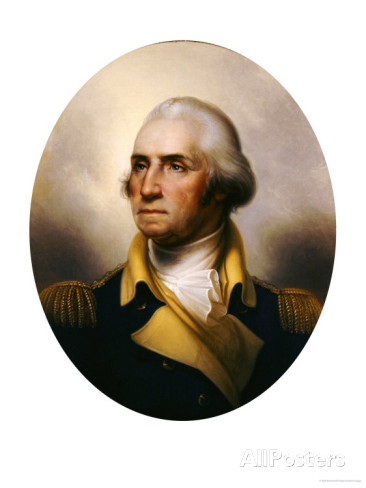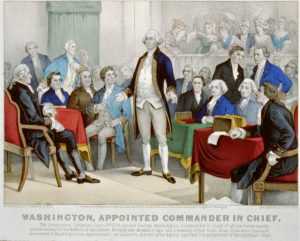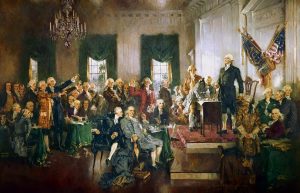Up Next: G. Washington, America's Master Politician

I’ve just signed with a Penguin imprint, New American Library, to write a book about The Big Guy — GWash himself, the Master of Mount Vernon, the man-myth who was indisputably the key figure in the founding of the United States and without whom, well, things would have gone very different and a whole lot worse for Americans. First in war, first in peace. . . . and the only human being for whom a global capital city is named!
Is this exciting? Absolutely. After writing three books in the Founding Era — The Summer of 1787, Madison’s Gift, American Emperor — I feel like I’m about to plunge into the back room where the priests put on their robes while wrestling with their doubts, that I’m approaching the beating heart of the whole enterprise. (Also, entering territory where my control over metaphors magically degrades.)
Is this intimidating? That, too. See, people have written books about Washington before. Maybe, I don’t know, a bajillion have so far. And some of those books have been really really good.
So what am I going to do different?
The Political Master and The Real Man
Washington was the third son of a second-tier Virginia planter with family connections that were relatively undistinguished for Virginia of the era. He had little formal education. With peers who read Latin and Greek and spoke French, who inhaled philosophical treatises and argued passionately about intellectual matters, he mostly held his tongue. He was a man of action in a generation of American leaders who thought great thoughts. Washington mostly kept his to himself.
Filled with ambition, Washington was a hard-driving slave master who didn’t shy from the need for violence to compel enslaved people to work. He could be grasping in commercial dealings. His greatest business venture — building a canal/water link between the Potomac and Ohio Rivers that would open up the American West — never succeeded, dashing the fortunes of many before it was abandoned a quarter-century after his death.
Yet when it came to public matters, he was as sure-footed a political operative as America has seen, or will ever see. As a military commander, his political skills in dealing with Congress were as important as his strategy for outlasting the British. Time and again as president, he faced complex, delicate political decisions and always weaved his way through competing concerns to reach an outcome that was both wise and effective. Take some obvious symptoms of this mastery: he won the four most critical political contests of his career, and the nation’s birth. No, that’s not all. He won them unanimously.
That’s right. No one voted against him.

Currier & Ives print of Washington’s selection as commander of the Continental Army, 1775
- That includes the 1775 vote by the Continental Congress to name him commander-in-chief of the Continental Army that would lead America’s drive for independence.
- That includes his elevation as president of the 1787 Constitutional Convention that created the world’s longest-lived constitutional democracy.

Washington presiding over the signing of the Constitution, 1787
So maybe you’re shrugging inside your mind and thinking, okay, but he was really tall and it was the olden days when no one faced any real political opposition. Not such a big deal for him to win like that, right?
Wrong. Those guys played for keeps, without pads or helmets.
Thomas Jefferson was as tall as Washington and way more articulate, but he didn’t have any cakewalks into the White House. The first time he ran for president in 1796? Got beat by John Adams, who was really short and had an evil temper. The second time, in 1800? He managed to nose out Adams but then was tied by his own running mate, Aaron Burr. How embarrassing was that? Jefferson finally gasped over the finish line after thirty-six anxious ballots in the House of Representatives. (All presidential election votes are collected here.)
Go down the list of early presidents. Adams? A one-term president, defeated in his bid for re-election. Madison? Lost his campaign for a seat in the U.S.Senate in 1789, and faced two contested elections for president; one was pretty tight. Monroe? Lost his race for the House of Representatives in 1789 and barely won nomination for president in 1816.
Easy? Only for Washington.
So where did the man’s political mastery come from? It sure didn’t come from books or higher education. I want to look hard at some often-neglected times in Washington’s early life. When he served in the British Army in the French and Indian War, it didn’t go very well. He squabbled with his superiors and left the service in frustration in 1758. After leaving the army, he served for sixteen years as a legislator in the Virginia House of Burgesses, and five years as a justice of the Fairfax County Court.
Then, when the independence crisis ripened in 1774 and 1775, Washington arrives as WASHINGTON, the man of the moment who commanded the respect of every other delegate in the room at the Continental Congress in Philadelphia, and of every soldier in the army he took command of. Something happened between 1758 and 1774. He transformed himself. How did he do that? How did he remake himself?
I don’t have snappy answers to all these questions today, but I have some ideas, and I hope to have compelling answers by the time the book comes out . . . in a few years.
It won’t be easy. Washington could be aloof. It was a technique for commanding respect while avoiding conversations where he might not shine. As a mature leader, he was always careful about what he said. But underneath layers of self-control and discipline was a man of ferocious intensity whose force of will impressed everyone who met him. To protect the man underneath the shell from our prying eyes, he had his wife, Martha, burn all of their intimate correspondence.
Even after Martha’s conflagration, there’s a crazy volume of Washington-related material to master. At least sixty-eight volumes of his papers are already in print.
But it’s more than just the volume of material. By now George Washington has become the marble man, the one whose monument in the city named for him is a massive phallic symbol, not an even slightly humanizing statute. I hope to chip away at that marble exterior and find the person underneath, one with fears and uncertainties and drive and even a sense of humor.
Wish me luck, and stay tuned.
We surely will want to do a radio program on this
You don’t have to say that twice!
David
Well worth doing, David. Good for you and good luck! I look forward to learning from it in these anxious, turbulent times.
GW seems to have done better by his slaves upon his death than Jefferson and most contemporaries. Is this true, and if so, how will you explain the transformation from being a hard-driving slave owner?
Bert — I’m going to hold off on providing much answer on this one until I’ve done a lot more work, but it’s a fascinating question. Henry Wiencek (sp?) wrote a book on the subject, “An Imperfect God,” which I’ll be digging out. . .
Best,
David
David, as with all of your previous books, I can’t wait to get my hands on it and devour every word. You are masterful in utilizing historical and little known tidbits to come to your conclusions. I look forward to the outcome.
Best wishes,
Ron Grant
Best of luck with this project. I look forward to seeing it with great anticipation.
You can do it! I can’t wait for the results.
Congratulations, David: Thrilled for you and for me and all of your bazillion other readers.
David, you ARE a glutton for punishment. Your rationale for the book is impeccable, by the way. And please be sure to include Napoleon’s largely forgotten quote about Washington because I always thought it underscored why he was as uniquely admired as he clearly was—-that only G. Washington was truly great as in all of history only he willingly gave up great power to go home.
David: If you do as fine a job on G.W. as you did on Madison this will be another great book. Good luck.
Can’t wait, David!
Hi David,
I didn’t think I had a shred of interest in GW, but your lively writing and fascinating questions about him have piqued my curiosity. I’m looking forward to reading your book!
Congratulations, David! Have you optioned the rights to the musical?
Keep us in mind for a book talk here at Thomas Balch Library!
Interesting. I’ll be curious what you find as to how much (1) he applied timeless principles of political success, (2) he used very time-specific traits and tools that would not be so successful today, and/or (3) his relative stoicism did his job for him, reassuring nervous, fractious rebels that he was good enough and certainly better than their sworn foes.
Wonderful news, David. I’d love to know how you decide you’ve researched enough and it’s time to write. However you do it, the final product will be terrific.
David—I’m sure you will bring GW into focus and personalize him in ways that understand the man beneath the myth, just as you did with Madison. Glad you have a publisher who will produce a great final product and promote it properly. Know I will do all I can to maximize its impact in North Texas when it’s released. Regards, Talmage Boston
David, Looking forward to your Fireside Forum Talk here at Leisure World of Md, on Sunday, May 7th, and then we can chat about Washington’s dealings with Dr David Ross of Bladensburg who provided GW with imported human labor from several continents. Ross was also known to GW through French and Indian War activities, his dinner on the way to the 1787 Constitutional Convention, and by the marriage of a NH Congressman with Ross’ daughter in 1797 and a visit by the congressman to Mount Vernon. The Potomac basin was closely knit. Ross also strongly supported the improvements needed for transportation on the Potomac and the development of iron works on the upper Potomac in Frederick County. This direction on GW is certainly needed. Cheers, Stu Lillard
David, appreciate you looking in depth at GW’s early life. He had a comfortable future compared to most colonists. Yet at 17, he worked as a surveyor in a “wilderness” familiar only to Native Americans and a handful of traders and missionaries. At 21, he traveled through the “wilderness” to NW PA to meet with the French. An injury likely would mean death in either situation. Why?
BTW, today’s off the grid and survivor TV would love his early life.
I was just commenting on a thread yesterday that I could not bring myself to read any more books about Washington because I found him the least interesting Founder, and I didn’t think there was anything left to say. However – based upon my experience with your historical analysis and your narrative skills, I will take that back and get a copy of your book as soon as it is available (and review it on my book blog of course!) Best of luck on this project!